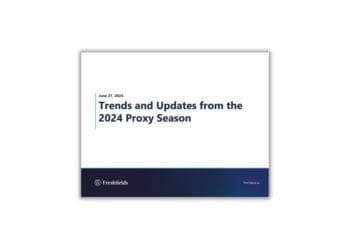A deadly pandemic, an economic crisis, social unrest and a contentious U.S. presidential election – these are some of the unprecedented challenges facing corporate boardrooms in 2020. So, how well have boards done in responding? Paula Loop analyzes results from a recent PwC report.
The COVID-19 pandemic and the economic turmoil it has caused have presented companies with unprecedented challenges. Public company directors believe that their boards and companies have done a good job of navigating the crisis so far. Amid the uncertainty of the current climate, they are increasing their focus on environmental, social and governance (ESG) matters, broader thinking about strategy and executive compensation and greater attention to company culture.
Yet some of the difficult problems we’ve identified in previous editions of our Annual Corporate Director Survey still confound boards. Directors continue to say they’re dissatisfied with their peers. They report that board leadership remains reluctant to have difficult discussions with underperforming directors. And, despite some improvements in boardroom diversity, some directors remain unconvinced of its value.
This year, our survey respondents included 693 public company directors representing companies in more than a dozen industries, 75 percent of which had revenues of more than $1 billion. Sixty-one percent have served on their board for more than five years. Here are the key takeaways from our findings:
Crisis Management Oversight is a Weak Spot
The economic disruption caused by the pandemic caught many companies off guard. Many directors say their boards had not taken steps to prepare for a downturn in the 12 months before the recession began. Fewer than half of directors (47 percent) say their boards had reduced capital expenditures. Forty-four percent had explored a sale or divestiture, but only one-third (33 percent) had reduced share buybacks, which would increase cash reserves or liquidity. In the year prior to the recession, only 14 percent had reduced the share dividends that investors had come to expect.
Overall, many directors say their boards are not well prepared for a crisis. Surprisingly, only 37 percent think that their board has a strong understanding of the company’s crisis management plan. But despite not fully understanding the plan and despite the clear missteps many companies made, most directors gave management high marks for their performance during the crisis.
Boards can leverage their companies’ experiences so far in 2020 to spur a complete evaluation of what worked, what didn’t and what needs to improve in the future. Through that evaluation and revision exercise, directors may also benefit from a deeper understanding of the whats and whys of the crisis plan. They will also be more prepared for the next chapter.
Despite Progress, There is Still Work to Do on ESG
Institutional shareholders have continued to emphasize to their portfolio companies the importance of creating long-term, sustainable business models. But directors are not convinced of the connection to the bottom line. Only 38 percent of directors say ESG issues have a financial impact on the company’s performance — down from 49 percent in 2019.
Nonetheless, directors are making ESG a higher priority. In 2020, just under half of directors (45 percent) say that ESG issues are regularly a part of the board’s agenda, up from just 34 percent in 2019. The share of directors saying that disclosing a company’s efforts on ESG-related issues should be a priority for management climbed from 30 percent to 41 percent. And the percentage of directors saying that environmental/sustainability expertise is important went up nine points, to 60 percent.
Two-thirds (67 percent) of directors say climate change should factor into their company’s strategic thinking, compared with 54 percent in 2019. But that appreciation hasn’t yet translated to comprehension. Only about half of directors say their board fully understands ESG issues impacting the company.
Diversity Brings New Voices and Perspectives to Boards, but is it a Priority?
There’s little disagreement among directors that diversity is beneficial to corporate boards. Ninety-four percent say that it brings unique perspectives to the room. More than four out of five directors agree that it improves relationships with investors (85 percent) and that it enhances board performance (83 percent). Seventy-two percent also agree that board diversity enhances company performance.
Yet progress remains incremental. Women accounted for 26 percent of S&P 500 directors, up from 16 percent a decade earlier. Female directors attribute the slow pace of change to leadership. They are more than twice as likely as their male counterparts to say board leadership isn’t committed to board diversity (44 percent to 20 percent) and more than three times as likely to say the same of CEOs (32 percent to 9 percent).
Even if they disagree on diversity at the board level, most directors agree it should be a priority for their companies. A large majority of directors (84 percent) say that companies should be doing more to promote gender and racial diversity in the workplace. But while incentive plans can be an effective way to encourage action, only 39 percent of directors support including diversity and inclusion goals in company pay plans. Fortunately, boards can lead by example here — including by taking a look at the boardroom itself and asking whether it truly has a diverse set of voices.
Failure to Plan is Stymying Board Refreshment
About half (49 percent) of directors say at least one of their fellow directors should be replaced. Twenty-one percent say that two or more directors should go.
So, what stands in the way? Many directors point to board leadership’s unwillingness to have difficult conversations with underperforming directors (20 percent) or to an ineffective assessment process (19 percent). And many boards do not make director succession planning a priority. Ten percent of directors say their board doesn’t have a succession plan at all, and 33 percent say it is ad hoc. For boards that do have a plan in place, less than half (49 percent) of directors actually share that plan with the entire board.
While most boards take performance evaluations seriously and take action as a result, they typically stop short of taking difficult steps with underperforming directors. Just 12 percent of directors say their boards chose not to re-nominate one of its members, and 14 percent provided counsel to an underperformer.
Opportunities Exist for Strong Boards
Boards face all of these challenges against the backdrop of a global crisis. But while the challenges are significant, this moment of crisis also creates opportunities. Forward-thinking boards find ways to inspire positive change. With strong leadership, boards may be able to leverage the crisis into changes in board composition, revamped board practices, re-envisioned diversity and inclusion efforts and re-focused board priorities.
Read the full 2020 Annual Corporate Directors Survey report from PwC here.



 Paula Loop is the leader for PwC’s Governance Insights Center. With more than 20 years of experience at PwC, Paula brings extensive knowledge in governance, technical accounting and SEC and financial reporting matters to both organizations. Paula is a Certified Public Accountant licensed in New York and is a graduate of the University of California at Berkeley with a B.S. in Business Administration.
Paula Loop is the leader for PwC’s Governance Insights Center. With more than 20 years of experience at PwC, Paula brings extensive knowledge in governance, technical accounting and SEC and financial reporting matters to both organizations. Paula is a Certified Public Accountant licensed in New York and is a graduate of the University of California at Berkeley with a B.S. in Business Administration.









